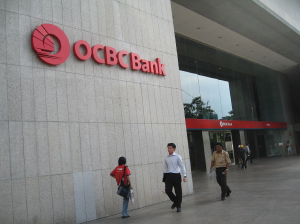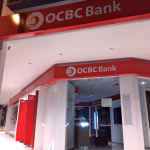OCBC Bank provides first property green loan in South Korea to M&G Real Estate
- This is not only the first property green loan, but also the first sustainable finance transaction by the bank in South Korea.
OCBC Bank is pleased to announce that it has provided its first green loan in South Korea of KRW115 billion to M&G Real Estate Asia (“M&G”). The loan will refinance an investment in Northgate, a green building in Seoul’s Central Business District. OCBC Bank is the sole lender and green advisor.
 This transaction is the first property green loan in South Korea. It also marks the first sustainable finance transaction in South Korea for OCBC Bank.
This transaction is the first property green loan in South Korea. It also marks the first sustainable finance transaction in South Korea for OCBC Bank.
The first property green loan proceeds will be used to refinance existing advances within M&G Asia Property Fund which have been extended for the investment in Northgate. M&G Asia Property Fund is an institutional core open-ended real estate fund investing in high quality real estate assets across the Asia Pacific region managed by M&G.
Northgate is a high-rise office building within the Seoul Central Business District which received the Leadership in Energy and Environmental Design (LEED) for Existing Buildings Operations and Maintenance Gold rating from the U.S. Green Building Council in 2016. The building’s notable green features include rainwater recycling systems, water efficient fixtures, LED lightings in common areas, Building Automation Systems to control Heating Ventilation & Air Conditioning and lighting fixtures. Environment-friendly materials are also used in the cleaning and general upkeep of the building. As of May 2020, Northgate’s ENERGYSTAR site EUI (Energy Use Intensity) score is 43.9, significantly lower than US office buildings’ median EUI score of 86.5.
Richard Van Den Berg, Fund Manager, M&G Asia Property Fund, said “We are pleased to partner with OCBC to diversify our capital structure that is in line with M&G Real Estate’s commitment to investing responsibly to deliver financial benefits and positive social value.”
Elaine Lam, Head, Global Corporate Banking, OCBC Bank, said, “We are delighted to partner M&G, a leading real estate fund in this landmark transaction, the first green loan in South Korea’s property sector. We hope that this will continue to spur developments in sustainable financing across industries and real estate asset classes in the region. To this end, we look forward to broader and deeper partnerships with our customers, as we aspire to grow our sustainable finance portfolio to S$25 billion by 2025.”
The first property green loan was issued under a green loan framework (“Framework”) that was prepared together with OCBC Bank in accordance with the Green Loan Principles issued in 2018 and updated in 2020 by the Asia-Pacific Loan Market Association, Loan Market Association and Loan Syndications and Trading Association.
Mr Paul Ho, chief mortgage officer at iCompareLoan, commenting on the first property green loan provided by OCBC said, “this is a landmark deal which will spur sustainable development in the overseas market.”
The green loan market aims to facilitate and support environmentally sustainable economic activity. The GLP have been developed by an experienced working party, consisting of representatives from leading financial institutions active in the syndicated loan market, with a view to promoting the development and integrity of the green loan product.
Green loans such as the first property green loan obtained by M&G Real Estate are aimed at advancing environmental sustainability and until quite recently came under the umbrella of Green Bond Principles.
They now have their own guidelines known as Green Loan Principles (GLP). The green loan market aims to facilitate and support environmentally sustainable economic activity. GLP have been developed by an experienced working party, consisting of representatives from leading financial institutions active in the syndicated loan market, with a view to promoting the development and integrity of the green loan product.
The green loan market aims to facilitate and support environmentally sustainable economic activity. The GLP have been developed by an experienced working party, consisting of representatives from leading financial institutions active in the syndicated loan market, with a view to promoting the development and integrity of the green loan product.
Their aim is to create a high-level framework of market standards and guidelines, providing a consistent methodology for use across the green loan market, whilst allowing the loan product to retain its flexibility, and preserving the integrity of the green loan market while it develops.
The GLP comprise voluntary recommended guidelines, to be applied by market participants on a deal-by-deal basis depending on the underlying characteristics of the transaction, that seek to promote integrity in the development of the green loan market by clarifying the instances in which a loan may be categorised as “green”.
In June 2020, OCBC said that it has set an ambitious new target of S$25 billion by 2025 for its sustainable finance portfolio, having surpassed its original S$10 billion target in the first quarter of 2020 – two years ahead of its 2022 schedule.
The bank has seen a significant increase in the demand for sustainable financing in recent years due to better awareness and heightened efforts to combat climate change. Natural disasters, including the Australian bushfires and heat waves in Japan and India in 2019 highlighted the urgency of the situation. Reports of lower pollution and clearer skies amidst COVID-19 quarantines and scaled-down business activities helped to draw even more attention to the environment.
Last year, OCBC Bank witnessed a strong demand for green and sustainability-linked loans. Of the more than 20 such loans that the bank participated in last year, it acted as sustainability advisor or coordinator for more than 10 of them. Good progress was also made in the financing of renewable energy projects, following the bank’s announcement in April 2019 that it would no longer finance new coal-fired power plants. In 2019, the bank participated in solar, onshore wind and offshore wind projects, in Taiwan, China, the United Kingdom, Australia and Malaysia.
Sustainable finance’s strong growth momentum is expected to continue over the next few years despite COVID-19. The United Nations has urged governments to view the pandemic as an opportunity to build a more sustainable economy. The European Union’s economic recovery package already has portions earmarked for green purposes. International Energy Agency’s recently released Sustainable Recovery Plan has laid out a US$3 trillion green recovery roadmap that can be taken over the next three years to revitalise economies and boost employment while making energy systems cleaner and more resilient.







